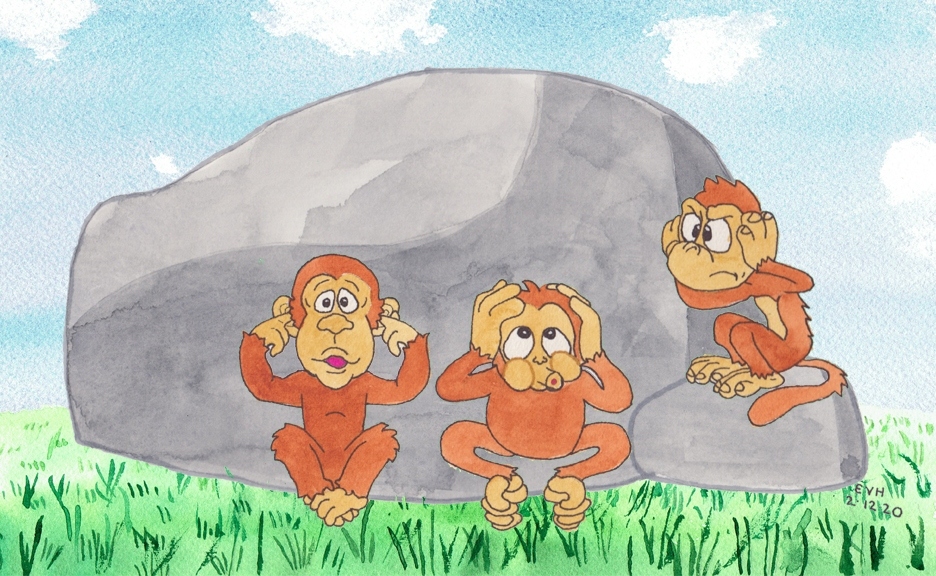
Jataka 219
Garahita Jātaka
The Story of Blaming
as told by Eric Van Horn
originally translated by William Henry Denham Rouse, Cambridge University
originally edited by Professor Edward Byles Cowell, Cambridge University
This story is reminiscent of the Christian saying, “It is easier for a camel to pass through the eye of a needle then for a rich man to enter the kingdom of heaven.” [Mathew 19:24] Although in this case the unskillful behavior of the rich has more to do with not seeing the impermanent nature of all conditioned phenomena. But the idea is the same. It is the delusion of the importance of wealth and status.
(There is a hilarious episode of The Simpsons in which the ultra-wealthy Mr. Burns hires a team of scientists to get a camel to pass through the eye of a needle. They do everything from breed tiny camels and build large needles to pureeing a camel and pouring it through the eye of a needle.)
The reaction of the monkeys to all of this is that the place where they heard about such bad behavior becomes a place of shame. It is reminiscent of the three monkeys who “hear no evil, see no evil, and speak no evil.” The three monkeys actually have their origins in Japanese Buddhism. The three monkeys are Mizaru, who covers his eyes, Kikazaru, who covers his ears, and Iwazaru, who covers his mouth. The meaning is that you should only associate yourself with good qualities of body, speech and mind.
“The gold is mine.” The Master told this story while he was at Jetavana. It is about a monk who was downcast and discontented.
This man could not concentrate his mind on any meditation object, and his life was full of discontent. This was reported to the Master. When asked by the Master if he really was discontented, he said “yes.” When he was asked why, he replied that it was because of his passions. “Oh, brother!” the Master said, “passion is despised even by the lower animals, yet you, a monk of such a high doctrine, give in to discontent arising from the passion that even brutes despise?” Then he told him this story from the past.
Once upon a time, when Brahmadatta reigned over Benares, the Bodhisatta came into the world as a monkey in the region of the Himalaya Mountains. A park ranger caught him, took him home, and gave him to the King. For a long time he lived with the King, serving him faithfully, and he learned a great deal about the manners of the world of men.
The King was pleased with his faithfulness. He sent for the park ranger, and he told him to set the monkey free in the same place where he had been caught. And so he did.
The entire monkey tribe gathered together on the face of a huge rock to see the Bodhisatta now that he had come back to them. And they spoke pleasantly to him.
“Sir, where have you been living this whole time?”
“In the King’s palace in Benares.”
“Then how did you get free?”
“The King made me his pet monkey, and being pleased with my tricks, he let me go.”
The monkeys went on, “You must know about the world of men. Tell us about it. We want to hear!”
“Don’t ask me the manner of men’s living,” the Bodhisatta replied.
“Do tell. We want to hear!” they said again.
“Mankind,” he said, “both princes and brahmins, cry out, ‘Mine! mine!’ They do not know about impermanence, by which things appear to be but are not. Hear now the way of these blind fools.” And he spoke these verses:
“’The gold is mine, the precious gold!’ so they cry, night and day.
These foolish folk never take a look upon the holy way.
“There are two masters in the house, one has no beard to wear,
But has long breasts, ears pierced with holes, and goes with braided hair.
His price is told in countless gold, he plagues all people there.”
On hearing this, all the monkeys cried out, “Stop, stop! We have heard what it is painful to hear!” and with both hands they covered their ears tight. They did not like the place because they said, “In this place we heard something terrible.” So they went elsewhere. And forever after this rock went by the name of Garahitapiṭṭhi Rock, or the Rock of Blaming.

Figure: Painful to Hear!
When the Master ended this discourse, he taught the Four Noble Truths, at the conclusion of which this monk attained stream-entry. The Master then identified the birth: “The Buddha’s present followers were that troop of monkeys, and I was their chief.”
